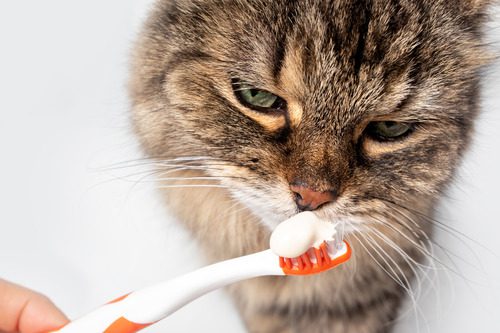Maintaining your cat’s dental health involves more than a shiny smile—it’s a critical aspect of their overall well-being. Cats are known for their grooming prowess, but their oral care requires a combination of professional cleanings and diligent home routines on the part of the owner. You might wonder, “What is a full cat teeth cleaning, and how can I support my pet’s dental health?” Let’s explore the details of a complete dental care plan for your feline friend and the steps you can take to protect their teeth and gums for years to come.

Why Your Cat’s Dental Health Matters
Cats are prone to developing dental diseases such as gingivitis, periodontitis, and tooth resorption. These conditions can cause discomfort, difficulty eating, and even systemic health issues if left untreated. One of the first signs of dental problems in cats is bad breath. While many owners dismiss it as a normal part of pet ownership, persistent foul odor can signal deeper issues. A combination of professional cleanings and home care helps combat the buildup of plaque and tartar, ensuring your cat’s teeth and gums stay healthy. Professional cleanings provide the thorough care needed to address hidden problems, while consistent home care helps prevent recurrence.
What Is a Full Cat Teeth Cleaning?
A full cat teeth cleaning involves a comprehensive process performed by your veterinarian to ensure your pet’s dental health is thoroughly addressed. This procedure goes beyond simple plaque removal, targeting areas of the mouth that regular brushing can’t reach. It also allows veterinarians to diagnose and treat issues that could otherwise go unnoticed.
Steps of a Professional Cat Teeth Cleaning
- Pre-Cleaning Exam: The process begins with a detailed oral exam to assess the condition of your cat’s teeth, gums, and oral cavity. If any visible concerns arise, they’ll be noted for closer examination during the procedure.
- Anesthesia: Cats must be placed under general anesthesia for a thorough cleaning. This ensures their comfort and allows your veterinarian to safely perform the necessary procedures without causing stress or discomfort.
- Scaling and Polishing: Plaque and tartar are removed from above and below the gumline using specialized tools. Once cleaned, the teeth are polished to smooth the enamel and make it harder for bacteria to adhere.
- 360-degree CT scans: Advanced imaging technology is used to capture a complete view of your cat’s oral structures. This allows your veterinarian to identify hidden problems such as tooth resorption, fractures, or abscesses that cannot be detected during a surface exam.
- Extractions (If Necessary): If a tooth is severely damaged or diseased, it may need to be removed. Extractions are performed with care to prevent further oral health complications.
A professional cleaning is not only about improving dental hygiene but also about diagnosing and treating issues that may go unnoticed during routine care. Regular appointments help reduce the risk of advanced dental disease and keep your cat healthier overall.
The Role of Home Care in Dental Health
Professional cleanings are indispensable, but home care is the backbone of your cat’s dental health routine. By integrating simple practices into your daily life, you can significantly reduce the buildup of plaque and tartar between veterinary visits.
- Regular brushing is the most effective way to maintain oral hygiene. Use a pet-safe toothpaste and a soft toothbrush designed for cats. Start slowly and gradually build your cat’s tolerance to the process.
- Certain cat foods and dental treats are formulated to help reduce tartar buildup. These products can complement brushing and professional care, making it easier to maintain a clean mouth.
- Adding dental solutions to your cat’s water bowl can help break down bacteria and freshen their breath. Be sure to use products recommended by your veterinarian.
- Some toys are designed to clean your cat’s teeth as they chew, offering a fun way to support their oral hygiene.
Signs Your Cat Needs a Professional Cleaning
Even with diligent home care, some dental issues may require professional attention. Some common signs of dental problems include:
- Persistent bad breath
- Red or swollen gums
- Difficulty chewing or eating
- Drooling excessively
- Pawing at the mouth
- Visible plaque or tartar buildup
- Loose or missing teeth
Balancing Professional and Home Care for Long-Term Health
Regular veterinary visits combined with daily practices create a robust foundation for oral health. Cats are experts at hiding discomfort, which makes proactive care even more important. Your veterinarian is an invaluable partner in this process. They can provide guidance on the best dental products for your cat and recommend the appropriate schedule for professional cleanings based on your cat’s age, diet, and individual health needs. By working together, you can ensure that your pet enjoys a pain-free and healthy life.
A Healthier Smile for a Happier Cat
Regular professional cleanings paired with consistent home care routines make a powerful duo in protecting your cat’s teeth and gums. With this combination, you’ll reduce the risk of painful dental diseases and help your cat maintain their vibrant energy and love for life. If you’re ready to learn more about professional cleanings or need advice on establishing a home care routine, call All Kinds Veterinary Hospital at (301) 994-9919 today. Our team is here to guide you in giving your cat the best dental care possible.
